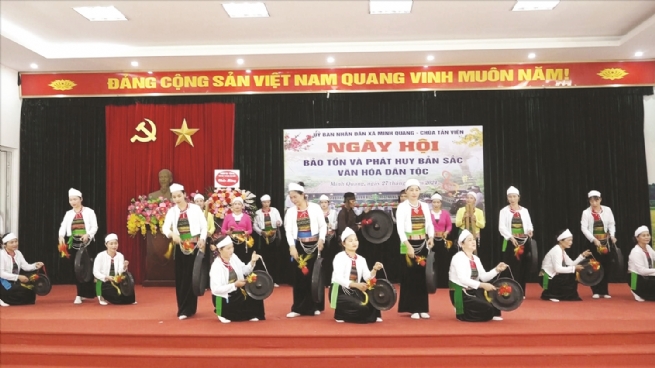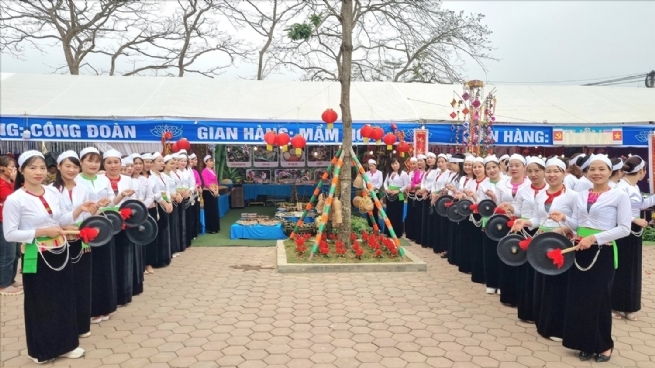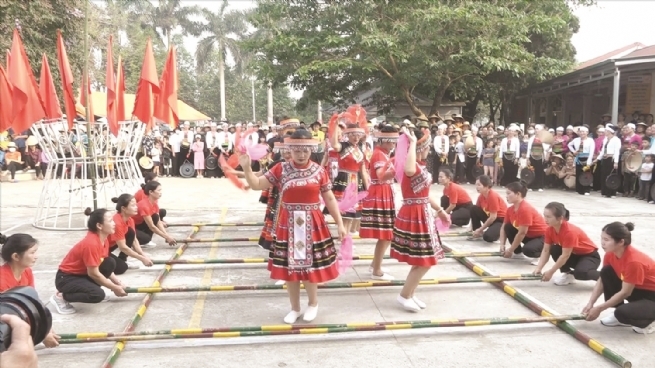In recent years, the implementation of the National Target Program on New Rural Development in Hanoi's ethnic minority regions has not only focused on improving material living standards but also placed a strong emphasis on preserving and promoting traditional cultural values. This harmonious combination helps create a rural landscape that is both modern and civilized, yet rich in ethnic identity.
Hanoi's ethnic minority areas span over 33,400 ha, accounting for 10% of the city's total area. Previously, these places faced many challenges regarding transport infrastructure, access to electricity and clean water, education, healthcare, and livelihoods. Fortunately, with the attention of central and municipal government and the effort of local residents, the rural landscape there has undergone a significant transformation. Notable examples are Yen Xuan, Yen Bai, Ba Vi, and Suoi Hai communes where the Muong and Dao ethnic communities live and make up more than 51% of the city's total ethnic minority population. These areas hold a strategic position in terms of national defense and security, and have great potential for socioeconomic development, ecological tourism, and community-based cultural tourism. Integrated with the New Rural Development Program, the harmonious development and preservation of cultural identity is focused by local authorities.

Local ethnic minority communities actively preserve and promote the nation’s traditional cultural identity
Comprehensive care for ethnic minority regions
According to the Hanoi Coordination Office of New Rural Development Program, before the formation of the two-level local government model, Hanoi had 13 ethnic minority communes, and 100% of them had already completed new rural development goals. Notably, some communes like former Ba Trai and former Minh Quang achieved advanced new rural development standards, showing clear evidence of positive changes in these lands.
In the commune of Yen Xuan, a new administrative unit formed by the merger of Dong Xuan commune (former Quoc Oai district), Yen Binh, Yen Trung and some parts of Tien Xuan and Thach Hoa communes (former Thach That district), the signs of new rural development are evident on every road and alley. Main roads are asphalted and village alleys are concreted, completely replacing muddy lanes on rainy days and dusty paths on sunny ones. Beyond infrastructure, community cultural life is also prioritized. Ms. Le Thi Thu, head of the Gong Club in Yen Binh 2 Village (Yen Xuan commune), said: "Our Muong ethnic people have been given more opportunities to preserve our cultural identity. The village was supported with two sets of gongs, and the community hall was newly built and is very spacious." Ms. Man Thi Thanh (Yen Bai commune), a Muong resident, also excitedly shared: "We still maintain the tradition of playing gongs and performing folk songs and dances during festivals and Tet. This is a beautiful custom that cannot be lost in our community life."
Ethnic culture is the root and identity that creates distinctive differences and highlights for each rural area. In Hanoi's ethnic minority communes, where the Muong and Dao communities have lived for a long time, cultural preservation has been seamlessly integrated into the New Rural Development Program and become an important spiritual pillar for socioeconomic development.

Development linked to identity
Each ethnic group has its own cultural identity, helping create diversity and richness. As a result, localities have great potential to develop ecological tourism activities linked to the preservation of ethnic cultural values, which can bring economic benefits like growing medicinal herbs and raising dairy cows. According to the Hanoi Coordination Office of the New Rural Development Program, all four communes of Yen Xuan, Yen Bai, Ba Vi, and Suoi Hai are potential for developing community-based tourism. Traditional Muong villages nestled among lush green forests, stilt houses, and the resounding sound of gongs during festivals are unique tourism resources. However, amid rapid social change and strong urbanization, these ethnic minority communes are also facing challenges. For example, Yen Xuan is planned to be part of the Hoa Lac satellite urban area, which raises the question of how to prevent cultural values from fading away.
Mr. Ngo Van Ngon, Deputy Chief of the Hanoi Coordination Office of the New Rural Development Program, stated that Hanoi is actively carrying out a set of consistent solutions, with an emphasis on the element of "development linked to identity." The city continues to prioritize investment in infrastructure, improve the quality of basic services such as education, healthcare, clean water, and rural transport. At the same time, it promotes community tourism rooted in indigenous values and supports the production of clean agricultural goods and One Commune One Product (OCOP) items that leverage local resources.

In addition, local authorities are strengthening the role of associations and unions in preserving ethnic identity, while also promoting communication and education to raise public awareness of traditional cultural values in the new era.
Ms. Doan Thi Thinh, Vice Chairwoman of the Vietnam Fatherland Front Committee of Yen Xuan Commune and Chairwoman of the Yen Xuan Women's Union, affirmed: "Women are the core force in preserving and promoting traditional beauty. We are stepping up activities of ethnic women's groups related to preserving folk culture, from cuisine and costumes to traditional performing arts."
She added that Hoa Lac-Hoa Binh Expressway and Metro Line 5 will be constructed through Yen Xuan commune in the coming time. When transportation becomes more convenient, tourism and trade will develop strongly. If cultural identity is preserved and a harmonious residential community is built, this area will undergo a powerful transformation.
New rural development in Hanoi's ethnic minority regions is not just a story about infrastructure, income, or socioeconomic indicators but it is also a journey of preserving and promoting traditional cultural values in a new, modern, civilized, humane, and sustainable form.
By Minh Ngoc, Vietnam Business Forum
|
This special section is supported by Hanoi Coordination Office of the New Rural Development Program |